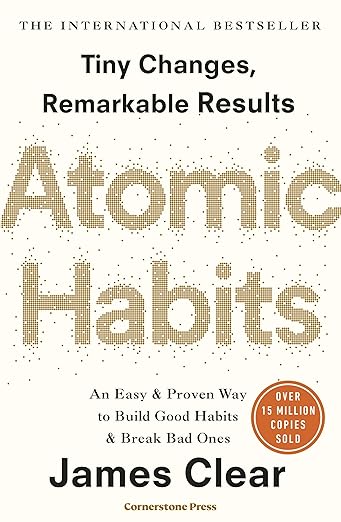
Ashwini Amit Gund , Student , SY BBA (CA), MES Senior College Pune
“Atomic Habits: An Easy & Proven Way to Build Good Habits & Break Bad Ones” by James Clear:
Review:
James Clear’s Atomic Habits is a game-changing guide for anyone looking to make lasting improvements in their life. Packed with practical advice and grounded in psychological research, the book focuses on how small, incremental changes—what Clear calls “atomic habits”—can lead to remarkable results over time.
The core idea of the book is simple yet powerful: small habits, when consistently practiced, compound into significant transformations. Clear breaks down the science of habits into four key principles, which he refers to as the Four Laws of Behavior Change:
1. Make it obvious – Design your environment to make good habits easier to start.
2. Make it attractive – Link habits to something rewarding or appealing.
3. Make it easy – Reduce the friction required to perform the habit.
4. Make it satisfying – Reinforce habits with immediate positive feedback.
Clear combines these principles with engaging anecdotes, scientific studies, and actionable strategies. For instance, he emphasizes the importance of focusing on identity over goals. Instead of merely aiming to lose weight or write a book, Clear suggests adopting the identity of a “healthy person” or a “writer.” This subtle shift in mindset makes the habit feel more intrinsic to who you are, increasing the likelihood of long-term success. Another standout concept is the two-minute rule, which advises readers to start habits so small that they seem almost effortless—for example, committing to just two minutes of exercise or writing. This approach removes the intimidation factor and helps build momentum.
Clear also addresses the psychology of breaking bad habits, offering tips on how to make them less appealing, harder to perform, and unsatisfying. For example, he discusses the power of “habit stacking,” where you pair a new habit with an existing one, and the importance of tracking progress to maintain motivation. What makes Atomic Habits particularly effective is its practicality. Clear provides clear steps and tools that readers can implement immediately. His writing is concise and approachable, with plenty of examples to illustrate his points. Whether you’re trying to develop a morning routine, improve productivity, or quit procrastination, the book feels directly applicable to everyday life. Critics of the book sometimes argue that the ideas are not entirely novel, as many are rooted in established behavioral psychology. However, Clear’s strength lies in synthesizing these concepts into a cohesive, actionable framework. His emphasis on small, incremental changes is both realistic and empowering, making habit-building feel less daunting.
In conclusion, Atomic Habits is an invaluable resource for anyone seeking to improve their life through better habits. It’s not just a self-help book—it’s a guide to understanding and mastering the small behaviors that shape your daily existence. Whether you’re a student, a professional, or someone looking to make a fresh start, this book provides the tools and mindset to achieve meaningful, sustainable change. Highly recommended!
